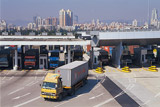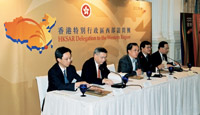- Hong Kong is the most important entrepot for China, handling
about 30% of the Mainland's foreign trade
- Hong Kong is the largest external investor in the Mainland,
accounting for about half — or US$187 billion
— of all realised direct investment in China
by end-2001
- Hong Kong is the largest, single external investor in all Mainland
provinces. There are about 110 000 Hong Kong firms investing in
the Mainland
- About five million people are employed in neighbouring Guangdong
Province by more than 36 000 companies wholly or partly-owned
by Hong Kong enterprises
- More than 190 000 Hong Kong people work in the Mainland, accounting for 6% of the employed population in Hong Kong. About 80% of them work as managers, professionals or administrators
2002-2003 Budget
The 2002-2003 Budget at a glance*
| Total public expenditure | HK$287.18 billion (US$36.82 billion) |
| Government expenditure | HK$259.8 billion (US$33.31 billion) |
| Government revenue | HK$214.6 billion (US$27.51 billion) |
| Consolidated deficit | HK$45.2 billion (US$5.79 billion) |
| Fiscal reserves (at 31-3-2003) | HK$325.6 billion (US$41.74 billion) |
In his first Budget since taking office in May 2001, the Financial Secretary, Mr Antony Leung, outlined his vision for Hong Kong's economic development and proposed measures to restore fiscal balance by 2006-07 and reduce the share of public expenditure in the economy. A package of one-off relief measures to help the community was also announced.
 |
Consumer prices fell by 1.6% in 2001 and were forecast to decline by 2.8% in 2002. Unemployment for 2001 as a whole was 5.1% but had since risen to a record high of over 7% in early 2002.
Mr Leung said Hong Kong had to capitalise on its strengths and needed to focus on high-added-value economic activities to move up the value chain. He believed there were four economic sectors in particular that could foster further economic development and create jobs — financial services, logistics, tourism, and producer and professional services.
He said the government would upgrade the quality of manpower and increase the number of talented individuals, by improving education and attracting outside talent. It would also enhance flows of people, goods, capital, information and services to and from the Mainland.
Mr Leung forecast a Budget deficit of HK$65.6 billion (US$8.4 billion) for 2001-2002 compared to the original estimate of HK$3 billion (US$385 million). A deficit of HK$45.2 billion (US$5.8 billion) was forecast for 2002-03 from revenues of HK$214.6 billion (US$27.5 billion) and expenditure of HK$259.8 billion (US$33.3 billion).
But he made a firm commitment to restore fiscal balance by 2006-07. From 2003-04 onwards, government spending would only be allowed to grow by 1.5% in real terms per year over the medium-term, half of the trend economic growth rate of 3%.
He pledged to reduce public expenditure as a percentage of GDP and set a target of bringing it down from its current level of 23% to 20% of GDP or below by 2006-07.
Because of difficult economic conditions, no major changes were introduced on the revenue side. However, Mr Leung signaled that the government would have to consider other options to raise revenue or reduce expenditure other than those outlined in the Budget if the fiscal situation did not improve in the medium-term.
Mr Leung also unveiled a HK$6.4 billion (US$820 million) relief package to help Hong Kong citizens and businesses ride out the economic downturn.
The concessions would mean that about 85% of ratepayers (about 2.3 million) would pay no rates for one year, 80% of households and businesses would pay no water and sewage charges for one year, and over 600 000 businesses would be exempt from paying business registration fees for one year.
China's entry to the World Trade Organisation
|
Hong Kong's strong links with the Mainland |
China's entry into the World Trade Organisation (WTO) in December 2001 has changed the face of the global economy. It has thrown open a huge market of 1.3 billion people and injects greater transparency and certainty into a vast and growing trading regime.
 |
Hong Kong enterprises will face increased competition from international companies vying for business in the huge Mainland market. But at the same time, market potential will continue to expand — trade flows in the Mainland are projected to increase quickly and significantly from their current annual level of US$510 billion. Their depth of knowledge and experience in the Mainland will give them an unrivalled edge in seizing opportunities.
China's WTO accession will not be a zero-sum game for Hong Kong — China's market is too big for just one or two major cities to take the lion's share of trade and investment opportunities. The sheer size and diversity of the market presents much room for further co-operation and partnership. In the process, Hong Kong and Mainland cities can make best use of their comparative strengths and advantages, creating a 'win-win' situation.
For example, in Guangdong and adjoining provinces there are more than 270 million people. On the eastern seaboard, there are now some 230 million people in the provinces around Shanghai and the Yangtze River Delta. Further north Tianjin is well-positioned in a market now of over 160 million people. Looking west Chengdu and Chongqing have the potential to service another 250 million people, of which almost 85 million live in Sichuan province.
While co-operation in services will remain the key theme in the prosperous coastal regions and big cities like Guangzhou, Beijing and Shanghai many other opportunities in the Mainland's domestic market will come from the developing, resource-rich inner and western provinces.
 |
Hong Kong businesses will have to work hard to leverage their existing strengths and contacts in the Mainland to capitalise on the enormous opportunities that will emerge in China over the next few decades.
Hong Kong's existing business links — as well cultural and language bonds — can also be an enormous resource for overseas companies, especially small and medium-sized enterprises, wishing to do business in China.
By joining forces with established Hong Kong businesses, overseas companies will be able to bring their products and services to the Mainland market as well as draw on the decades of experience of Hong Kong's entrepreneurs. Hong Kong companies have already joined forces with joint venture partners in the Mainland to do just that.
Hong Kong's quality of life — boosted by good education and health services... — will help to ensure that it remains China's first entrepot for several years to come. But the pace of change in Shanghai, and the excitement the city generates among foreign investors, could quickly narrow the gap. If Hong Kong is to remain superior to both Shanghai and Shenzhen, it will have to reinforce both its strengths: its legal independence, and its economic interdependence. —The Economist, March 29, 2002
Shanghai's impressive development over the past decade has led some to question whether Hong Kong can retain its role as the premier international financial centre for China.
Often, comparisons between Hong Kong and Shanghai — as well as elsewhere in China such as Shenzhen and Guangzhou — are explained in terms of 'win and lose'. That is, the increasing prosperity in Shanghai and Guangzhou is to the detriment of Hong Kong.
This is a very simple and flawed argument that overlooks the complementary, rather than competitive, roles that Hong Kong and Shanghai play, and the different focus of development in the Pearl River Delta and Yangtze River Delta.
The Pearl River Delta is much more externally-oriented economy than the Yangtze River Delta; services and flourishing private sector enterprises are the main economic drivers in the Pearl River Delta while the Yangtze River Delta has accommodated more heavy industry as well as the recent emergence of IT-related industry.
Hong Kong is and will remain the pre-eminent international financial centre for the entire Mainland, a major hub for regional headquarters in the Asia-Pacific and a growing centre of trade and investment for the fast-developing domestic economy in the Pearl River Delta.